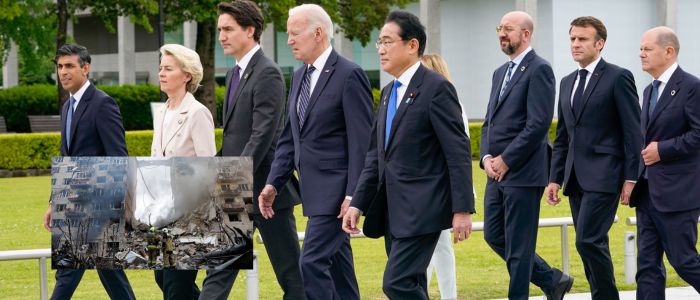The sanctions are being coordinated with G7 allies at a summit taking place in Alberta, Canada. Sir Keir said the new measures would hit Russia’s energy receipts and cut the flow of money it is using to fund the military action in Ukraine. But no specifics of the sanctions have been released yet, as talks at the summit are ongoing.
Downing Street said that the sanctions would be targeted at maintaining pressure on Russia’s military-industrial complex but declined to provide additional details.
New Actions Are Opposed by Trump and US May Not Join
Even with the UK’s advocacy, the US might not join the new sanctions. Earlier, speaking at the G7 before announcing that he had left the summit early because of mounting tensions in the Middle East, former President Donald Trump expressed some reservations. He emphasized the strain on the US economy sanctions create, claiming that “you’re talking about billions and billions of dollars”.
Trump underscored that he would prefer to see things develop between Russia and Ukraine peace wise before he agrees to any new sanctions. His position and exit from the summit early indicate also that the US may not be part of the new sanctions package.
Ukrainian President Volodymyr Zelensky and leaders of other allied countries had been looking to persuade Trump to take a firmer stand against Moscow at the 75th anniversary of the World War II victory summit. But given that the president is averse to new penalties, their efforts are met with resistance.
Russian oil pricing and global pressure over talks
Leaders at the G7 summit are also likely to touch on the pricing of Russian oil. A price cap of $60 per barrel was imposed in December 2022 with the aim of restricting Russian access to Western markets, but its effectiveness has been reduced by falling energy prices.
The European Commission is proposing $45 per barrel (£33.18) as a maximum cap, and Ukraine is demanding a limit of $30 (£22.12). There are also demands from Western allies for more biting sanctions that focus directly on Russia’s energy sector, financial institutions and those who supply the Russian military.
In the US, certain senators are considering steep tariffs on countries buying heavily discounted Russian oil, concentrating on China and India. However, it is unclear whether such interventions will succeed.
While speaking at a press conference with Canadian Prime Minister Mark Carney, Trump also blasted the decision to expel Russia from the G7 in 2014 over its annexation of Crimea. He called the removal “a mistake” and said it “complicates life” for international diplomacy.
World

UK to unveil new Russia sanctions during G7 summit

The UK government is to announce a fresh package of sanctions targeted at reducing Russia's military strength. Prime Minister Sir Keir Starmer said the new package would strengthen the economic stranglehold on Moscow and prove to President Vladimir Putin that achieving peace is in the interests of his own country.















